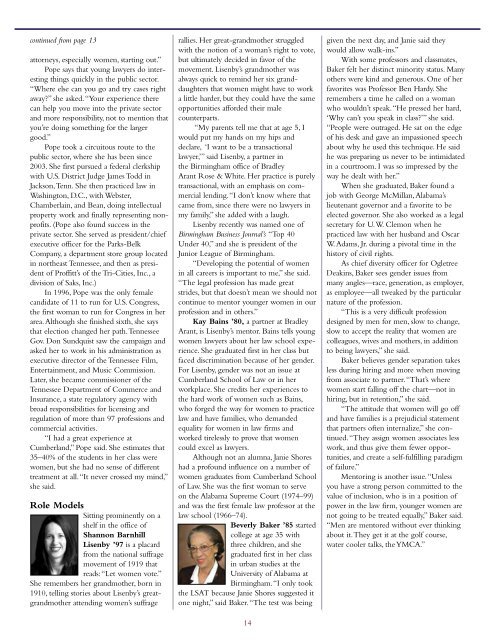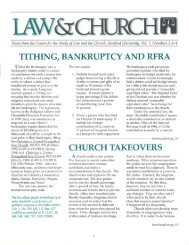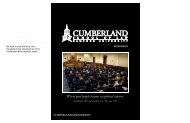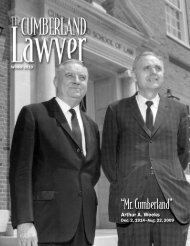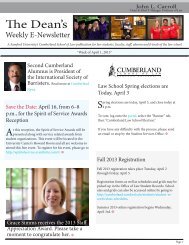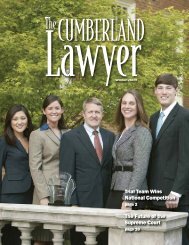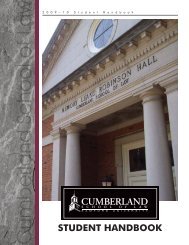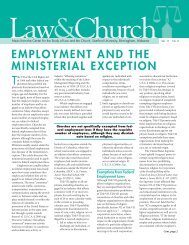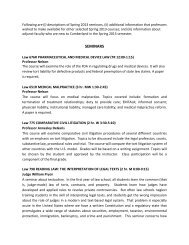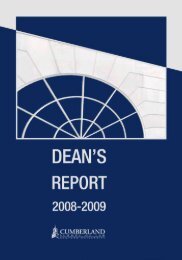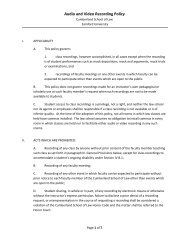Fall 2008 - Cumberland School of Law - Samford University
Fall 2008 - Cumberland School of Law - Samford University
Fall 2008 - Cumberland School of Law - Samford University
Create successful ePaper yourself
Turn your PDF publications into a flip-book with our unique Google optimized e-Paper software.
continued from page 13<br />
attorneys, especially women, starting out.”<br />
Pope says that young lawyers do interesting<br />
things quickly in the public sector.<br />
“Where else can you go and try cases right<br />
away?” she asked.“Your experience there<br />
can help you move into the private sector<br />
and more responsibility, not to mention that<br />
you’re doing something for the larger<br />
good.”<br />
Pope took a circuitous route to the<br />
public sector, where she has been since<br />
2003. She first pursued a federal clerkship<br />
with U.S. District Judge James Todd in<br />
Jackson,Tenn. She then practiced law in<br />
Washington, D.C., with Webster,<br />
Chamberlain, and Bean, doing intellectual<br />
property work and finally representing nonpr<strong>of</strong>its.<br />
(Pope also found success in the<br />
private sector. She served as president/chief<br />
executive <strong>of</strong>ficer for the Parks-Belk<br />
Company, a department store group located<br />
in northeast Tennessee, and then as president<br />
<strong>of</strong> Pr<strong>of</strong>fitt’s <strong>of</strong> the Tri-Cities, Inc., a<br />
division <strong>of</strong> Saks, Inc.)<br />
In 1996, Pope was the only female<br />
candidate <strong>of</strong> 11 to run for U.S. Congress,<br />
the first woman to run for Congress in her<br />
area.Although she finished sixth, she says<br />
that election changed her path.Tennessee<br />
Gov. Don Sundquist saw the campaign and<br />
asked her to work in his administration as<br />
executive director <strong>of</strong> the Tennessee Film,<br />
Entertainment, and Music Commission.<br />
Later, she became commissioner <strong>of</strong> the<br />
Tennessee Department <strong>of</strong> Commerce and<br />
Insurance, a state regulatory agency with<br />
broad responsibilities for licensing and<br />
regulation <strong>of</strong> more than 97 pr<strong>of</strong>essions and<br />
commercial activities.<br />
“I had a great experience at<br />
<strong>Cumberland</strong>,” Pope said. She estimates that<br />
35–40% <strong>of</strong> the students in her class were<br />
women, but she had no sense <strong>of</strong> different<br />
treatment at all.“It never crossed my mind,”<br />
she said.<br />
Role Models Sitting prominently on a<br />
shelf in the <strong>of</strong>fice <strong>of</strong><br />
Shannon Barnhill<br />
Lisenby ’97 is a placard<br />
from the national suffrage<br />
movement <strong>of</strong> 1919 that<br />
reads:“Let women vote.”<br />
She remembers her grandmother, born in<br />
1910, telling stories about Lisenby’s greatgrandmother<br />
attending women’s suffrage<br />
rallies. Her great-grandmother struggled<br />
with the notion <strong>of</strong> a woman’s right to vote,<br />
but ultimately decided in favor <strong>of</strong> the<br />
movement. Lisenby’s grandmother was<br />
always quick to remind her six granddaughters<br />
that women might have to work<br />
a little harder, but they could have the same<br />
opportunities afforded their male<br />
counterparts.<br />
“My parents tell me that at age 5, I<br />
would put my hands on my hips and<br />
declare, ‘I want to be a transactional<br />
lawyer,’” said Lisenby, a partner in<br />
the Birmingham <strong>of</strong>fice <strong>of</strong> Bradley<br />
Arant Rose & White. Her practice is purely<br />
transactional, with an emphasis on commercial<br />
lending.“I don’t know where that<br />
came from, since there were no lawyers in<br />
my family,” she added with a laugh.<br />
Lisenby recently was named one <strong>of</strong><br />
Birmingham Business Journal’s “Top 40<br />
Under 40,” and she is president <strong>of</strong> the<br />
Junior League <strong>of</strong> Birmingham.<br />
“Developing the potential <strong>of</strong> women<br />
in all careers is important to me,” she said.<br />
“The legal pr<strong>of</strong>ession has made great<br />
strides, but that doesn’t mean we should not<br />
continue to mentor younger women in our<br />
pr<strong>of</strong>ession and in others.”<br />
Kay Bains ’80, a partner at Bradley<br />
Arant, is Lisenby’s mentor. Bains tells young<br />
women lawyers about her law school experience.<br />
She graduated first in her class but<br />
faced discrimination because <strong>of</strong> her gender.<br />
For Lisenby, gender was not an issue at<br />
<strong>Cumberland</strong> <strong>School</strong> <strong>of</strong> <strong>Law</strong> or in her<br />
workplace. She credits her experiences to<br />
the hard work <strong>of</strong> women such as Bains,<br />
who forged the way for women to practice<br />
law and have families, who demanded<br />
equality for women in law firms and<br />
worked tirelessly to prove that women<br />
could excel as lawyers.<br />
Although not an alumna, Janie Shores<br />
had a pr<strong>of</strong>ound influence on a number <strong>of</strong><br />
women graduates from <strong>Cumberland</strong> <strong>School</strong><br />
<strong>of</strong> <strong>Law</strong>. She was the first woman to serve<br />
on the Alabama Supreme Court (1974–99)<br />
and was the first female law pr<strong>of</strong>essor at the<br />
law school (1966–74).<br />
Beverly Baker ’85 started<br />
college at age 35 with<br />
three children, and she<br />
graduated first in her class<br />
in urban studies at the<br />
<strong>University</strong> <strong>of</strong> Alabama at<br />
Birmingham.“I only took<br />
the LSAT because Janie Shores suggested it<br />
one night,” said Baker.“The test was being<br />
14<br />
given the next day, and Janie said they<br />
would allow walk-ins.”<br />
With some pr<strong>of</strong>essors and classmates,<br />
Baker felt her distinct minority status. Many<br />
others were kind and generous. One <strong>of</strong> her<br />
favorites was Pr<strong>of</strong>essor Ben Hardy. She<br />
remembers a time he called on a woman<br />
who wouldn’t speak.“He pressed her hard,<br />
‘Why can’t you speak in class?’” she said.<br />
“People were outraged. He sat on the edge<br />
<strong>of</strong> his desk and gave an impassioned speech<br />
about why he used this technique. He said<br />
he was preparing us never to be intimidated<br />
in a courtroom. I was so impressed by the<br />
way he dealt with her.”<br />
When she graduated, Baker found a<br />
job with George McMillan,Alabama’s<br />
lieutenant governor and a favorite to be<br />
elected governor. She also worked as a legal<br />
secretary for U.W. Clemon when he<br />
practiced law with her husband and Oscar<br />
W.Adams, Jr. during a pivotal time in the<br />
history <strong>of</strong> civil rights.<br />
As chief diversity <strong>of</strong>ficer for Ogletree<br />
Deakins, Baker sees gender issues from<br />
many angles—race, generation, as employer,<br />
as employee—all tweaked by the particular<br />
nature <strong>of</strong> the pr<strong>of</strong>ession.<br />
“This is a very difficult pr<strong>of</strong>ession<br />
designed by men for men, slow to change,<br />
slow to accept the reality that women are<br />
colleagues, wives and mothers, in addition<br />
to being lawyers,” she said.<br />
Baker believes gender separation takes<br />
less during hiring and more when moving<br />
from associate to partner.“That’s where<br />
women start falling <strong>of</strong>f the chart—not in<br />
hiring, but in retention,” she said.<br />
“The attitude that women will go <strong>of</strong>f<br />
and have families is a prejudicial statement<br />
that partners <strong>of</strong>ten internalize,” she continued.“They<br />
assign women associates less<br />
work, and thus give them fewer opportunities,<br />
and create a self-fulfilling paradigm<br />
<strong>of</strong> failure.”<br />
Mentoring is another issue.“Unless<br />
you have a strong person committed to the<br />
value <strong>of</strong> inclusion, who is in a position <strong>of</strong><br />
power in the law firm, younger women are<br />
not going to be treated equally,” Baker said.<br />
“Men are mentored without ever thinking<br />
about it.They get it at the golf course,<br />
water cooler talks, theYMCA.”


